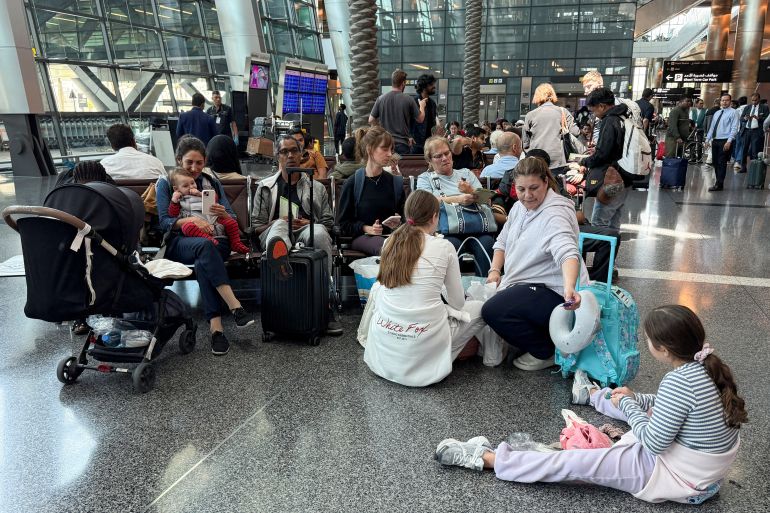Travel disruptions still hit Middle East in wake of US-Israel-Iran conflict
Airlines are forced to reroute or cancel flights, affecting major hubs like Doha and Dubai, despite a ceasefire announced between Iran and Israel.

Published On 24 Jun 202524 Jun 2025
The Israel-Iran conflict, together with the military intervention of the United States and Tehran’s retaliation, has continued to heavily disrupt global travel despite some Middle East nations saying their airspaces were now open again.
The delays, suspensions and cancellations by multiple airlines continued on Tuesday after Iran launched a limited missile attack on US forces at Qatar’s Al Udeid Air Base on Monday in retaliation for US strikes on Sunday at three Iranian nuclear sites.
Recommended Stories
list of 3 itemsend of list
Qatar temporarily closed its airspace just hours earlier, forcing state-owned Qatar Airways to announce that its flights were suspended because of the closure.
Airports throughout the region have been on edge since Israel began the deadly conflict on June 13 – with a surprise barrage of attacks on Iran, which retaliated with its own missile and drone strikes.

In the days following the US strikes, more and more carriers cancelled flights, particularly in Qatar and the United Arab Emirates, which sit just across the Persian Gulf from Iran.
While US President Donald Trump announced a truce between Tehran and Tel Aviv late on Monday night, many airlines have halted select routes through the middle of the week, citing safety concerns.
Middle East carriers severely affected
Dubai-based Emirates suspended all flights to Iran and Iraq, including those serving Baghdad and Basra, through June 30. An unspecified number of other Emirates flights were rerouted but continuing to operate as scheduled, using flight paths well distanced from conflict areas, according to the airline, which added that some flights may be delayed.
Advertisement
Gulf Air, the carrier of the Kingdom of Bahrain, extended the cancellation of scheduled flights to Jordan until June 27.
Air tracking data from FlightAware showed 382 cancellations worldwide just after 10:30am ET (14:30 GMT) Tuesday, following 834 cancellations seen on Monday.
Airports in the Middle East are some of the busiest in the world, covering an area stretching from Iran and Iraq to the Mediterranean and serving as a connecting hub for flights between Europe and Asia.
However, in an early sign of normalcy returning to the region, Iraqi airspace reopened and flights were now transiting it, flight-tracking website Flightradar24 wrote on X on Tuesday.
It’s unclear whether Iranian airspace is now also open to international arrivals and departures to and from Tehran.
In the meantime, the Israel Airports Authority says Ben Gurion Airport near Tel Aviv is returning to full operation.
Meanwhile, Singapore Airlines cancelled some flights to and from Dubai starting Sunday and through Wednesday, citing “a security assessment of the geopolitical situation in the Middle East”.
And British Airways said it had suspended flights to and from Doha through Wednesday, adding that it “will keep the situation under review”.
